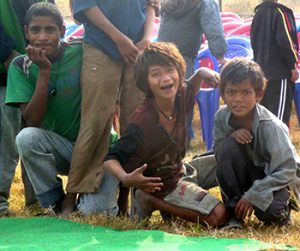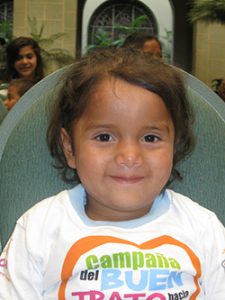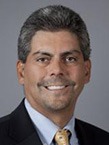Welcome to the December 2012 issue of the Global Washington newsletter. If you would like to contact us directly, please email us.
IN THIS ISSUE
- Note from our Executive Director
- Featured organization: Viva: Creating a better world for children through the power of the network
- Welcome new members
- Announcements
- Global Washington and members in the media
- Career Center
Note from our Executive Director
 Greetings,
Greetings,
I hope you are enjoying time with your friends and loved ones during this holiday season and are looking forward to the approaching new year.
We recently hosted our 4th Annual Conference: Redefining Development—From Silos to Collective Impact. We were thrilled to hear from some attendees that it was our best conference yet! For this we owe a huge thank you to our volunteers, speakers, sponsors, event staff, and amazing conference planning committee. Perhaps even more importantly, we would like to thank our members and other attendees for their thoughtful participation. As we continue to focus on collective impact, collaborative opportunities like our annual conference will become more and more important. We hope that you keep in mind how much stronger and more effective we can be when we learn from each other work together!
Recap information from the conference is available on our website, including photos, videos, and blogs and I hope you will take some time to review it if you were not able to attend. The entire day was a big success, but several aspects of the conference stood out to me as especially exciting. Dr. Sakena Yacoobi’s morning remarks about her work in Afghanistan to train teachers and to help children get an education really illustrated an idea that many of our members are embracing: investing in women and children is critical if we want to see positive change. As Dr. Yacoobi said, “Afghanistan will have peace when the women of Afghanistan are leaders.” We were honored to have the chance to spend time with such an influential and visionary leader.
Our morning plenary was a dynamic discussion with key leaders about public-private partnerships and how they can create lasting social impact. This was a productive conversation on a complex and often controversial subject and I hope to see more exploration of this topic in the future. One of my favorite parts of the conference was a session called “The Doctor is In,” where experts on various topics—from fundraising, to technology, to jobs in global development—facilitated mini-sessions to help attendees get answers to their questions. I have wanted to host a session like this for many years and am grateful to our wonderful “doctors” for helping us make it happen!
We closed our day with a keynote address from Craig Kielburger, founder of Free The Children and Me to We. Craig’s work to inspire our youth to give and invest in the world also inspired all of us to continue to what we are doing to make a difference! I appreciated his energy and enthusiasm for this cause and am excited to see the results of Seattle’s first “We Day” celebration for youth in the U.S., coming up in Seattle in March.
In case I don’t say it enough, I really appreciate your engagement with Global Washington over the past year. Your participation is essential for us to promote and support global development in our state and I look forward to continued collaboration in 2013!
In unity,
![]()
Bookda Gheisar, Executive Director
Viva
Creating a better world for children through the power of the network
By Megan Boucher

Some of the rescued boys in Nepal at a network project, two days before being reunited with their families.
The police in Bhaktapur, Nepal learned that some local sari-making factories were employing very young children, an illegal but pervasive practice in Nepal. Before executing a raid on the factories, the police contacted the local Viva network and asked for volunteer assistance. The network coordinator contacted several local churches who were part of the network and within 24 hours mobilized 80 volunteers who accompanied the police on the raid. 127 children were rescued from the factories and the network was able to look after all of the children–one project taking three, another taking four, another working to send them home to their families, and so forth.
Viva’s collaborative networks are composed of diverse groups that share one common denominator: all are working to improve the lives of children within their community. Without the Nepalese network, there would have been no way to mobilize so much support so quickly as no one organization or police force would have been able to care for so many children. With a head office in the United Kingdom and a smaller office in Seattle, Viva operates in-country networks in 35 cities around the world, working under an innovative model of collaboration. Their logo states the simple but powerful concept that underlines all of the organization’s work: “Viva: Together for Children”
Viva was founded about 16 years ago by Patrick McDonald, who started the faith-based organization after volunteering with children in Paraguay as a young man. Disheartened by the heartbreaking situations of the children, Patrick experienced what he describes as a vision from God where he pictured a globe with small pinpricks of light, representing hope and people responding to the problems children were facing. The light was dim, but the pinpricks began to join up and get brighter until eventually the light became stronger and took over the whole globe. This inspiration gave Patrick the idea that to really solve these problems, we need work together. In his local community, he quickly discovered that four different churches were feeding children in a local park, unaware of each other, and all running their program on the same night. Consequently, the street children ate well on Monday, but had nothing the rest of the week. The newfound awareness allowed these programs to coordinate and feed children throughout the week. This simple solution represented the beginning of Viva.
The premise is simple: in any given city there are a huge amount of people working to make a difference for children through feeding centers, hospitals, orphanages, anti-trafficking programs, schools, and many others. However, few of them are speaking to each other, even fewer are working together, and most are not even aware of each other’s existence. When Viva forms a network, they seek to get all of these diverse players in the same place. From the local women trying to feed street children out of her home to the international NGO with extensive projects in the city, Viva provides a platform for collaboration, resource sharing, learning, and collective impact.
Once established, Viva networks operate independently, but are supported by the larger organization. Network coordinators are local, usually indigenous individuals who are able to help lead the networks in a way that is culturally and regionally appropriate. During the earlier stages of a network’s existence, Viva will often see practical results. For instance, a school might need extra space to expand and through the network will connect with a church that has free space during the week. Local businesses might have extra food to donate to a feeding program. A project that provides services only for girls might become aware of a similar project for boys and start referring boys to a place to go for help instead of turning them away.
Viva also creates helpful programs that are designed to run on a network platform, for instance, trainings on topics like child protection or trauma counseling. They also have a program called “Child Friendly Church,” designed to help churches become more welcoming places for children.
However, Viva wants to make a more significant difference beyond strengthening network members in their everyday work. As networks grow, they are starting to attract more notice and Viva is seeing a new phenomenon: the power of the collective voice. Beth Gaukroger, Communications and Prayer Manager for Viva, described Viva’s presence in Bolivia, where networks in 6 different cities have joined together to become a countrywide voice that is now able to participate in government-level conversations on child protection and child-focused issues. “You’re including projects like the couple who decided to adopt two kids and ended up taking 20,” explained Beth. “When would they ever get to speak to the government? Who is going to listen to them? They are just two ordinary people, probably quite poor themselves. They have got no voice. But now that they’re part of a network, their voice is being heard in that network and in government positions.”

Five-year-old Ingrid, who got a chance to advice the Vice President of Guatemala
Beth described even more exciting developments in Bolivia where the children themselves are now speaking to the government. Called the “Child Ambassadors” program, these children are running a “buen trato” (“good treatment”) campaign by going out on the streets with candy and petitions, grabbing every passing adult, and talking to them about how to treat children well. About 2000 children participated last year and gained around 28,000 signatures, which were presented to the president of the house of parliament in Bolivia. “Something like that has considerably more power than adults telling other adults how to treat children better,” explained Beth. She described something similar in Guatemala where a 5-year-old-girl had the chance to approach the Vice President and ask him to please treat children well. “How do you say no to that?” Beth laughed. The Child Ambassadors program started in Latin America, but has since been picked up by Viva networks in Africa as well.
Networks exist to strengthen the work of individual members, but also decide what macro issues are important areas of focus. In India, for instance, girls’ education has a lot of attention from the network because there are so many social and political issues surrounding it. It is extremely powerful for so many diverse groups to come together around these issues. “Working together is so not easy,” Beth explained. “It requires humility, wisdom, insight and tenacity. And it’s not about us as an organization or a project. The most important thing is that children are helped.”
Viva has had tremendous success in its existing networks, but still sees considerable room for growth. The organization is resisting pressure to expand geographically and instead hopes to strengthen and deepen its existing networks. “We want our growth to be quality, not quantity,” said Beth. “We want to continue working in these countries to make our networks more effective and see greater change.” They are looking more towards areas of prevention—for instance preventing child trafficking—rather than just helping children that have already been affected by these issues.
Viva has a strong emphasis on unity and cooperation. “This is where our faith comes into play,” explained Beth. “The Bible talks about unity and working together. We are many parts of one body and we are all vital. This mentality flows into the networks—each part is essential, but they are stronger together.” Viva’s is enthusiastic about being a member of Global Washington as both organizations emphasize a very strong message that diverse entities can work together to make a more powerful impact.
Welcome New Members
Please welcome our newest Global Washington members. Take a moment to familiarize yourself with their work and consider opportunities for support and collaboration!
ChangeStream Media
ChangeStream Media’s mission is to educate, inspire and improve the social welfare of disadvantaged communities worldwide through digital media. The organization will seek knowledge that can unlock brighter futures, and share it with a wide audience using multimedia storytelling. www.changestreammedia.org
International Development Exchange
IDEX identifies, evaluates, and grows the best ideas from local leaders and organizations to alleviate poverty and injustice around the world. IDEX connects a passionate and engaged network of supporters to the visionary leaders and organizations creating lasting solutions to their communities’ most pressing challenges. www.idex.org
Skagit Valley College
Since its founding in 1926, Skagit Valley College has been respected as a leader in providing access to quality higher education, economic development, and cultural enrichment, where diverse learners expand their opportunities and horizons to better themselves and their communities. www.skagit.edu
Ashoka
Ashoka envisions an Everyone A Changemaker™ world: a world that responds quickly and effectively to social challenges, and where each individual has the freedom, confidence and societal support to address any social problem and drive change. Ashoka strives to shape a global, entrepreneurial, competitive citizen sector: one that allows social entrepreneurs to thrive and enables the world’s citizens to think and act as changemakers. www.ashoka.org
Russell Investments
Whether you’re an institutional investor, a financial advisor, or an individual guided by an advisor’s personalized advice. We’re a global asset manager and one of only a few firms that offer a true multi-asset approach to investing, combining asset allocation, manager selection and dynamic portfolio management. www.russell.com
Individuals
James Duffus
Announcements
Lumana: Holiday Giving Campaign
Last week, Lumana launched its holiday giving campaign and invites supporters to come together over the holidays and learn about West African culture. This campaign is a chance to learn about the people and culture of Ghana and to empower villagers with the tools they need to eradicate poverty. The campaign is focused around a cookbook that features the Lumana team’s favorite Ghanaian recipes!
For more information about this campaign, please visit:
http://lumana.geocko.com/campaigns/d9z.
The World Justice Project Launches A Global Contest to Advance the Rule of Law
The World Justice Project is pleased to announce the launch of their Roderick B. Mathews Opportunity Fund Competition—their first online, global competition to identify innovative ideas that advance the rule of law. The WJP provides seed grants to implement solutions to issues of rule of law on the ground, and acts as a justice laboratory.
“All individuals, organizations, and entities are eligible to enter the competition and may submit multiple entries. In addition to funding, Opportunity Fund winners will receive publicity, research, and networking support from the WJP. Winners may also have the opportunity to present their work at the 2013 World Justice Forum, a global gathering that brings together hundreds of leaders and dignitaries.”
To enter the competition, visit: worldjusticeproject.org/opportunity-fund-competition.
Please send questions or comments to: opportunityfund@wjpnet.org.
GAPPS Announces a Request for Proposals in Preterm and Stillbirth Research
The Global Alliance to Prevent Prematurity and Stillbirth (GAPPS) announced a request for proposals as part of their Preventing Preterm Birth Initiative. This is an opportunity to develop research sites in low- and middle-income countries to examine causes of preterm and stillbirth.
The full request for proposals is here: http://gapps.org/index.php/research/healthy_birth/, and the deadline for letters of inquiry is February 15, 2013.
For more information, please visit: http://gapps.org/index.php/research/healthy_birth/.
PATH Names Amie Batson as Chief Strategy Officer
Late last month, Amie Batson was appointed to the newly-created position of chief strategy officer at PATH. Currently the senior deputy assistant administrator for global health at USAID, Ms. Batson will join PATH in April 2013. She will help to guide PATH’s strategy and strengthen its partnerships and business ties in the global health community. “I look forward to joining PATH, an institution known for its entrepreneurship and innovation in global health,” said Ms. Batson. “With its global footprint and history of advancing valuable technologies, PATH is an important player in helping countries and partners take on new and better approaches to save lives.”
CityClub hosts 2013 Legislative Preview
On Friday, January 11th , CityClub will host a 2013 Legislative preview and luncheon. The event will feature Rep. Frank Chopp, Speaker of the House (D), 43rd Legislative District; Senator Ed Murray, Senate Majority Leader (D), 43rd Legislative District; and Senator Mark Schoesler, Republican Floor Leader (R), 9th Legislative District. Don’t miss this special in-person opportunity to speak directly to top leadership from the State House and Senate about the upcoming session and let them know about your priorities for our state!
Location: Sheraton | Grand Ballroom | 1400 Sixth Avenue, Seattle, WA 98101
Doors Open: 11:30 a.m. | Luncheon & Program: 12:00 p.m. – 1:30 p.m.
Price: Luncheon – CityClub Members – $40 | Guests & Co-Promoters – $45 | General Public – $50; Coffee & Dessert – CityClub Members – $12 | Guests & Co-Promoters – $15 | General Public – $18
Global Washington and Members in the Media
Seattle Times publishes editorial and the importance of foreign aid
As the fiscal cliff looms ahead, the Seattle Times published an editorial last week telling Congress that cuts to foreign aid should be a last resort. Citing the work of Washington’s global health and global development institutions, the Times insists that these programs are life-changing for people in developing nations and are also important to this huge job-creating sector in the state of Washington. Global Washington wholeheartedly agrees that the contributions of Washington’s global development institutions are crucial, both to our community in the state, and to work being done abroad.
Global Washington conference an example of how NGO’s work together
The article “Seattle NGOs asked to do something incredible: work together” appeared in the The Seattle Globalist last week and described Global Washington’s 4th Annual Conference as an opportunity for diverse organizations to come together and find ways to collaborate. “I’m an amateur choir geek and a professional international development wonk. Those things might seem unrelated, but they do have one thing common: when talented and creative people come together, beautiful harmonies are made,” wrote author Joy Portella.
Humanosphere blog discusses Global Washington conference themes
“Seattle pushes women’s rights & private sector to fight poverty” cites the Global Washington conference and the Seattle International Foundation’s Women in the World breakfast as examples of a growing focus in development work on women’s rights and public/private partnerships.
Career Center
Highlighted Career
 Name and Profile
Name and Profile
Chris Rivera, President, Washington Biotechnology & Biomedical Association
How would you describe your job?
Leader of WA’s life science trade association. Mission is to support and grow life science jobs in the state. More.
Highlighted Paid Positions
Program Manager—Global Visionaries
Provide managerial and administrative oversight for leadership program for high-school students. Work directly with participants, parents, and interns in managing all components of the program. Coordinate logistics for events, class nights, retreats, volunteer events. Implement / Deliver curriculum and training on eco-footprint, cross-cultural, and social justice issues. Mentor and support student fundraising; provide support to low-income students. Communicate regularly with parents, and teachers. More.
Market Intelligence Analyst – The Bill & Melinda Gates Foundation
The primary purpose of the Market Intelligence Analyst role is to support the design, development, and day-to-day management of market analytics and information for the Life Sciences Partnerships team in its core sectors: multinational pharmaceutical companies, developing country manufacturers, venture capital firms, and biotech companies. The Market Intelligence Analyst will report directly to the Senior Program Officer (SPO) in Life Sciences Partnerships responsible for the multinational pharmaceutical industry strategy. More.
Highlighted Internship Opportunities
Global Envision Contributor Internship – Mercy Corps
Mercy Corps is seeking contributors to its Global Envision program. Global Envision is Mercy Corps’ blog about innovative, market-based solutions to poverty, explored through news, commentary and discussion. The Global Envision contributor internship is ideal for candidates who are self-described ‘news junkies’ and who can boil down complex topics into bite-sized but thoughtful commentary, and connect the dots between global poverty, markets and business. More.
For more jobs and resources, visit www.globalwa.org/resources/careers-in-development/
Editor: Megan Boucher